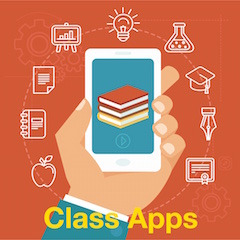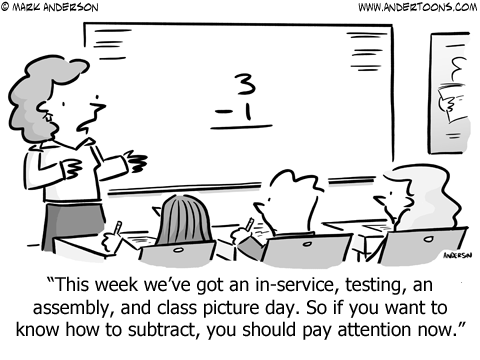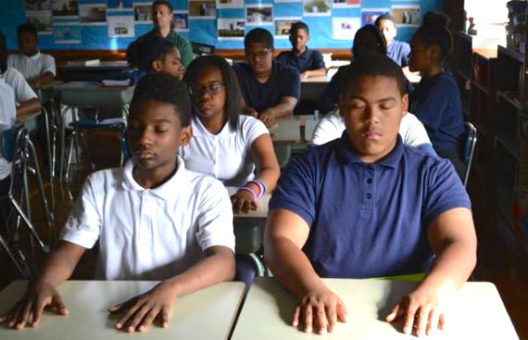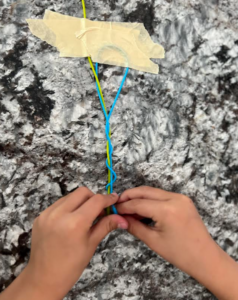
Despite the welcome change of warmer weather, Spring often brings a multitude of other seasonal challenges. It can be a time of stress, schedule interruptions, and computer labs/carts that are booked for months at a time. Why? Because for the next two months…it’s testing season.
For many teachers, the onset of annual testing can feel like an approaching storm. It makes sense. Whether it’s curriculum, instruction, assessment data or class scheduling…the effects of nearly three decades of high-stakes assessments are felt – at least to some extent – in just about every classroom (Plank & Condliffe, 2013).
The testing debate is as much alive now as it has ever been. For years now, supporters of high-stakes assessments have insisted that accountability encourages teacher collaboration, transparency, and the use of data to improve student learning.
Critics, on the other hand, believe that state-mandated tests are negatively impacting the classroom and focus teachers and students more on passing tests than on developing thorough, critical skills needed in today’s society. The impact may be greatest among students from low-income families (Gonzalez et al., 2017; Porter, 2000).
Whatever our personal or professional views might be towards standardized testing, the reality is that assessment season is as much a part of middle school life as emojis, pubescence or AXE body spray. With that reality in mind, here are some tips for helping teachers and students stay focused on what really matters during upcoming weeks and months of testing.
Teachers…Watch Your Stress!
Stress is like cupcake frosting. A little bit is absolutely necessary, but too much can be overpowering. That’s why it’s important that teachers take steps to manage their own fears and frustrations during testing season.

Click to enlarge.
There has been quite a bit of research of late about how teachers’ stress and frustration can affect their students’ well-being and achievement (Sparks, 2017). One recent study found that teachers reporting higher levels of stress also had students with higher levels of the stress hormone cortisol each morning, suggesting that our own assessment angst can be “contagious” to others in our classroom.
In another study, researchers from the University of Groningen in the Netherlands interviewed 143 beginning teachers over the course of a year and found that those with higher stress levels at testing season were more likely to display fewer effective teaching strategies over the rest of the school year – including clear instruction, effective classroom management, and creation of a safe and stimulating classroom climate for their students.
These and other studies underscore the need for each educator to be conscientious of verbal and nonverbal messages we communicate to our class during this busy, and sometimes taxing, part of the school year.
Social Emotional Strategies for Teachers and Students
Whether we are a teacher or student, each of us benefits from strategies designed to help handle emotional, mental, and physical stress. Research indicates that students who utilize Social Emotional Learning (SEL) strategies are more likely to be successful in school/daily life, develop confidence, have more positive relationships, graduate from high school, go on to college, and have a career (Durlak, 2015).

For starters, teachers and students can try out activities such as…
• Stop, Breathe, and Think. Here teachers can find free access to over 100 activities that range from guided mindfulness audio tracks, to videos on yoga, and animated mindful games. New activities are added each month on Stop, Breathe & Think All Ages and Kids apps.
• MINDFUL from UCLA. Developed by the Mindful Awareness Research Center at the University of California, Los Angeles (UCLA), the app features about a dozen calming meditations of different types in English and Spanish.
• Similar useful activities are also can also be found at Positive Psychology, Confident Counselors, and MindBodyGreen.
For teachers looking for examples of how other teachers are using social emotional learning strategies, check out the following Teaching Channel videos:
• Building Class Culture with Social Skills Goals
• Building Emotional Literacy
• Using Guided Relaxation in the Classroom
• Building School Culture with Community Circles.
• Mindfulness in the Classroom
Open the Lines of Communication
One of the most important things we can do is to be honest and open with our students during testing season. State testing shouldn’t come as a surprise, nor should students be left guessing about if – and to what degree – it is important or consequential.
Since high-stakes tests are likely to create a bit of angst in our students, teachers should help students see annual assessments as an opportunity to exercise grit, work hard towards goals, show improvement, and feel good about putting forth their best effort.
I find it helpful to communicate confidence in my students and their abilities by relating tests to other activities they are involved in and working hard at. After having them identify an activity they are involved in that takes a lot of discipline, I often say something like…
Think of how hard you are working in your sport…to practice your instrument…or to complete your woodshop project. This upcoming test is a lot like those things. This test isn’t something to be afraid of. It’s just one of many chances for us to play, perform, and show how our all our hard work is taking shape. All I ask is that all of us do our best. Your best is always good enough for me.
Even in the most encouraging of classrooms, however, student anxiety still surfaces from either (a) not knowing what a test will be like; or (b) having been unsuccessful on similar tasks in the past. Keeping students’ anxiety at bay, therefore, requires educators to address both these factors by helping students feel prepared for higher stakes exams, setting goals that focus on personal growth rather than comparison with their classmates, and experiencing success on related tasks during the weeks that lead up to major exams.
Facilitating vs. Debilitating Stress
A few years ago, I wrote about how a small amount of worrying can be helpful and actually improve our teaching by spurring us into action. Consider, if you will, the circumstances surrounding my recent 20-year class reunion. For years I had talked about eating healthier, exercising more, and buying something snazzy to wear to replace the 90’s Zoot suit still hanging in my closet. Yet, it was the impending reality of rubbing shoulders with my old classmates that finally coerced me into do anything about it.
In a similar way, it is sometimes the healthy worrying about an upcoming assessment that gets us working. The key is to keep teachers’ and students’ anxiety levels at a facilitative level, to take steps to ensure that neither teachers – nor their students – become overly anxious about assessments.
We can accomplish this by working throughout the year with students to monitoring progress in their current performance levels and by providing specific feedback about the content and skills they still need to develop. It also means designing and scaffolding test-like opportunities that help students be successful and working to build students’ self-efficacy through clear, concrete, and realistic expectations for performance.
A Focus on Fun
I am a firm believer that every chunk or bit of time we have with students – no matter how short it may be – should be time spent learning. That’s why it’s equally necessary to ask ourselves…what’s the best thing I can do when my kiddos are NOT being tested?
Testing is one of many things that need to be done, but is far from the most important. Learning should be challenging…and fun. If we feel that our classroom is lacking in the latter, it’s a good time address the balance and build in some real-world opportunities to solve problems, make mistakes, and do something creative.
The good news is that no matter what you teach, there are plenty of meaningful, condensed, ready-to-implement activities for your classroom. Here are some of my favorites in a variety of content areas.
True to the ‘Core’
Too often the only ‘core’ we hear about is the ‘common core’ and the assessment practices it – and the rest of the standards movement – has spurred. If we are to find joy and balance in this busy season, we need to remind ourselves of the true ‘core’ of why we do what we do.
Our day-to-day instructional practices and interactions shouldn’t be driven by the next big test, but rather by our desire to help students – with their unique experiences and backgrounds – develop the critical thinking and social-emotional learning skills they need for success in today’s world.
References
Durlak, J. A. (2015). Handbook of Social and Emotional Learning: Research and Practice. The Guilford Press.
Gonzalez, A., Peters, M. L., Orange, A., & Grigsby, B. (2017). The influence of high-stakes testing on teacher self-efficacy and job-related stress. Cambridge Journal of Education, 47(4), 513-531.
Plank, S. B., & Condliffe, B. F. (2013). Pressures of the season: An examination of classroom quality and high-stakes accountability. American Educational Research Journal, 50(5), 1152-1182.
Sparks, S. D. (2017). How teachers’ stress affects students: A research round-up. Education Week Teacher.





